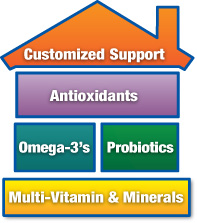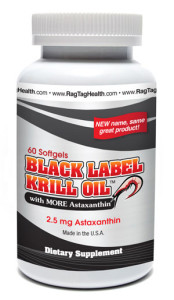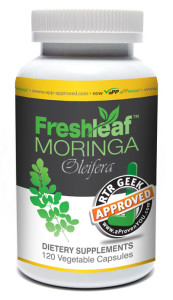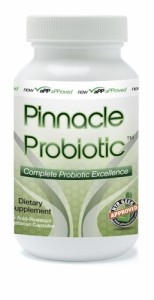
Inflammation. In a lot of ways it’s a double-edged sword – it’s something your body uses to fight off infections, and without it wounds would never heal. Whenever you have an infection or injury, the redness, heat and swelling you see is your body’s immune system in action.
But once the infection or wound is taken care of, your body is supposed to shut off the inflammatory response. All too often, however, it doesn’t. And this leads us to the other edge of the sword: chronic inflammation.
Too Much Of A Good Thing Is VERY Bad
The problem with chronic inflammation is that it doesn’t just affect the area that was wounded or infected. It’s a system-wide low level of inflammation that affects every cell in your body. Like water dripping on a rock eventually causes it to wear away, an endless trickle of immune cells interferes with the body’s healthy tissues. And it leads to some pretty major problems.
One of the scariest things about chronic inflammation is that there are no symptoms – unless you count the growing number of degenerative diseases that are being attributed to it. But these only show up years later.
Which means that thousands, probably millions of people are walking around with a ticking time bomb, never realizing the state of danger their bodies are in.
What Causes Chronic Inflammation?
There are several things that can cause chronic inflammation. Smoking, toxins and pollutants in the environment. Being obese. Repeated infections.
 But perhaps the biggest culprit is the typical American diet.
But perhaps the biggest culprit is the typical American diet.
Specifically, the ratio of Omega-6 to Omega-3 fatty acids. Both fatty acids are essential, meaning they’re something your body needs but cannot make. They must be consumed.
One of the things Omega-6’s do is stimulate inflammation. Omega-3’s, however, are anti-inflammatory. So having a proper balance of both is key. The optimal balance is 1:1. But most Americans get anywhere from 15 to 50 times more Omega-6 than Omega-3.
Why? Well, the reason becomes obvious when you see where Omega-6 comes from. Sources of Omega-6 include:
- Poultry
- Eggs
- Grains
- Most vegetable Oils
- Corn Oil
- Canola Oil
- Red meat
By contrast, sources of Omega-3’s include:
- Oily fish such as salmon, herring, mackeral
- Grass-fed beef
- Eggs from specially-fed chickens
When you consider how much of our diet adds Omega-6, the “eat fish twice a week” addage seems a bit like trying to put out a bonfire with a squirt gun.
And again, there are no obvious symptoms of chronic inflammation. No pain, no “warning signs” to look out for. Until…
Long Term Effects of Chronic Inflammation
There is mounting evidence and growing consensus that chronic inflammation is at the very least a contributing factor to (if not the outright cause of) a host of debilitating diseases, including:
- Alzheimers Disease
- Parkinsons Disease
- Asthma
- Atherosclerosis
- Cardiovascular Disease
- Diabetes
- Obesity
- Polycystic Ovarian Syndrome
- Insulin Resistance
- Cancer
Just to name a few. At this point it seems almost impossible to overstate the dangers of continuing to eat the same unhealthy foods. We really are digging early graves for ourselves!
What To Do About Chronic Inflammation
Whether you already suffer from any of the above conditions or not, it’s critical that you take action to end the cycle of chronic inflammation in your body before more damage is done.
Here are the steps we suggest:
1. Eat more fresh fruits and vegetables, less simple carbohydrates and processed foods. And yes, more fish. It may not be possible to get all the way to a 1:1 ratio of Omega-6 to Omega-3 with our busy lifestyles, but the closer you can get the better.
2. Get enough sleep. Too little sleep has been shown to increase markers of inflammation. For that matter it’s also been shown to increase the risks of cardiovascular morbidity. Plus, it makes you grouchy. You should try to get at least 7 hours per night of good restful sleep.
3. Get more antioxidants in your system. Oxidation contributes to inflammation. Antioxidants are anti-inflammatory. To find out more about antioxidants and our recommendations for them, see our article Understanding Antioxidants.
4. Strengthen your immune system with Probiotics. Inflammation is an immune system response, and 80% of your immune system takes place in your digestive tract. Probiotics ensure peak health and performance. Learn more about them in our section on Probiotics. (Or see the probiotic supplement we recommend below).
5. Most importantly, get more Omega-3’s. Repeated studies have found that Omega-3’s, specifically EPA & DHA, are the key to combatting chronic inflammation. For years fish oil has been studied as an effective source of Omega-3’s with good results. But recently krill oil has been found more effective.
Obviously we’d like to see you follow all 5 of these steps. But if you had to choose only one, we’d recommend you add a Krill Oil supplement to your routine as soon as possible.
Rag-Tag Research Geek Recommendations
 Chronic Inflammation is one major reason both Omega-3’s and Probiotics share the ground floor in our Blueprint For Health.
Chronic Inflammation is one major reason both Omega-3’s and Probiotics share the ground floor in our Blueprint For Health.
Much like the kitchen and bathroom are two of the most important rooms in your home, these are some of the most crucial supplements to add to your routine.
Specifically, we recommend:
Black Label Krill Oil™
 This is one of our favorite products in all the supplement world!
This is one of our favorite products in all the supplement world!
- Contains the highest amounts of EPA and DHA (the Omega-3’s found to be the most effective against inflammation) of any krill oil on the market
- More astaxanthin (the anti-inflammatory antioxidant powerhouse) than any other krill oil available
Where To Find It:
Contains strains from all five genera – including anti-inflammatory strains like Bifidobacterium Lacits and Lactobacillus Rhamnosus – for a COMPLETE probiotic that colonizes the ENTIRE digestive tract.
Where To Find It:
Our Favorite Antioxidant: Freshleaf Moringa Oleifera™
 Known as the “Miracle Tree” in Himalayan India where it grows, Moringa Oleifera redefines “superfood.”
Known as the “Miracle Tree” in Himalayan India where it grows, Moringa Oleifera redefines “superfood.”
Its been featured on several daytime TV shows for its incredible wellness and energy benefits, stemming from its power-packed nutritional profile. Moringa Oleifera leaves contain:
** Seven times more vitamin C than an orange
** Three times the potassium of a banana
** Three times the iron of almonds, and as much as 25 times more than spinach
** Four times the calcium of milk, and twice the protein
** 47 different antioxidants
Where to find it:



I tried taking a medication one time that was packed in fish oil. I broke out in a rash and my doctor determined I am allergic to fish oil, as I could take the medication when not packaged in fish oil. I can eat fish and shell fish with no problem, not sure why fish oil was problematic for me. Should I be concerned that I could also be allergic to krill oil?
I would love to be able to say yes, but really I would rather you discuss that with your doctor to be safe. I have seen folks who are allergic to fish oil use krill oil with no allergy symptoms, but I have also seen the opposite. I’m sorry I do not have a more definite answer, but I would rather for your safety that you check with the experts. Best of luck to you, kk1647!
I very healthy for a 77 year old Female. No problems what-so-ever, and take NO medication. I have always gone the Alternative way when it came to my health. My eyes, heart, limbs, stress level, and frankly my outer appearance is 10-15 years younger. When someone remarks about ‘how I look’….I just say thanks.
I have two questions…
(1) what do you think of the One Minute Cure?
(2) I am very interested in ‘inflammation’ because several friends have died of neumonia(?) IN the hospital. A nurse in one instance commented that there was so much inflammation in this
person’s system…medication could not work. I will be taking
the Red W when it arrives…but I am curious. Thanks for all you
do….I am so glad you are here for us, with truth and honesty.
Hi there Wellsie. It’s great to hear about how great you’re doing. As to the One Minute Cure, as much as it pains me to say this, I don’t know. It has never been tested by a party who doesn’t have a vested interest in either proving or disproving it, so it has not been properly vetted. I can’t see how it might hurt anyone, but I wouldn’t bet the farm on it.
Inflammation is quite a topic. In short, inflammation is what happens when cells are damaged. Generally, this is because of something like pneumonia or other infection, but it can be from particulates (gout) or it can be from arthritis or a similar condition. This is the cell’s attempt to protect itself, but can have the opposite effect in certain situations.
Antioxidants and immune system enhancers can reduce inflammation, and help to prevent it from secondary sources. Acai is the most common antioxidant, but fish oils and sea buckthorn and others are also viable. You should consult a physician before beginning any supplement regimen.
I hope that helps.
Per your reference to “stimulate inflammation” I did read more of the referred citation within http://www.umm.edu/altmed/articles/omega-6-000317.htm#ixzz27DYsen7T). They cite Weaver KL, et al. “Effect of dietary fatty acids on inflammatory gene expression in healthy humans.” wherein they first stimulate neutrophils to assess ω6/ω3 ratios on expression of inflammatory pathway genes. Omega-6 oils do not cause or stimulate inflammation, they promote or facilitate it. However, Palmitic acid DOES cause inflammation in that it increases serum IL6, the major killer, which controls the cascade of inflammatory mediation (and is reciprocally associated with longevity). see: http://www.ncbi.nlm.nih.gov/pubmed/22030225
There’s more to just trusting one review of others’ research. Dig? Question authority!
Hey durium,
You’ve got a point about palmitric acid directly causing inflammation, but Omega-6 fatty acids act as a catalyst for the inflammatory operation. In a way, it’s like smoking; smoking doesn’t technically cause cancer, but the chemicals in it increase the likelihood of irregular cell growth. Similarly, of the Omega-3 count in a person’s blood is higher then his Omega-6 count, his body won’t metabolize the palmitric acid as well or as quickly. If the ratio is reversed, then he will absorb the palmitiric acid quickly, and develop dangerous inflammations.
I also get what you are saying about http://www.umm.edu/altmed/articles/omega-6-000317.htm#ixzz27DYsen7T ; the conclusion is pretty simplified and does not do justice to the science. The linked causality of inflammation between Omega-6 and palmitirc acid, however, does validate the conclusion that a reduction of Omega-6 (or at the very least an equalization with Omega-3) equates to a reduced risk of dangerous inflammation.
Here is some further reading you might find interesting:
http://www.jacn.org/content/21/6/495.long (Demonstrates the link between increased omega-3 and reduced inflammation)
http://www.nutritionjrnl.com/article/S0899-9007%2896%2900000-8/abstract (other compounds which do similar functions as Omega-3 in regards to inflation.
The original article in question also sites more than just Weaver, and there is some very interesting information in the other studies.
Thanks for your interest on this subject, as well as your comment!
I’m taking life oil sea buckthorn is this an anti inflammatory also? Or should krill oil be used also?
That’s an excellent question, tripleg251! Life Oil Sea Buckthorn is one of the only natural sources for the rare plant-based Omega-7 fatty acid, which has been found to aid weight loss, help prevent type 2 diabetes, improve the look and feel of skin, and help to prevent cardiovascular disease in some tests. So it’s really used more for skin and weight loss benefits than as an anti-inflammatory, but Omega-7 does have some anti-inflammatory properties.
Red Whale Krill Oil contains astaxanthin which has tremendous anti-inflammatory and anti-oxidant capabilities and a whole host of exciting health benefits. Astaxanthin is best if found in Krill oil because the krill has already “processed” or esterified the astaxanthin and converted it to a form your body can more readily absorb.
So, to make a “long story short”, it really depends on preference, and the amount of anti-inflammatory and other properties you need. It is a great idea to use both supplements together, as they are both different types of antioxidants.. one is fat soluble (krill) and the other water soluble.. so you come at the “problem” from different angles. Hope that helps!
Are you still out of kril oil ?
Hi Olya! Yes, unfortunately at this time, it looks like it will be closer to the end of the month that supplies will be restored. I’m terribly sorry, Both the manufacturer and the sites that sell Red Whale are doing everything they can to make sure this doesn’t happen again. Thanks for stopping by, and have a great afternoon!
I recently was diagnosed with gluten intolerance. My daughter was diagnosed with celiac disease over 1 year ago. I was unaware that gluten could cause so many medical problems, including inflammation throughout the body, leading to painful days and nights. I wonder if you have found gluten to be a contributing factor to the autoimmune diseases Americans get?
this site covers what you are concerned about.
http://www.ncbi.nlm.nih.gov/pubmedhealth/PMH0001280/
hope it helps.